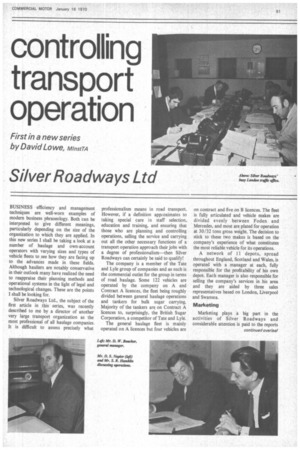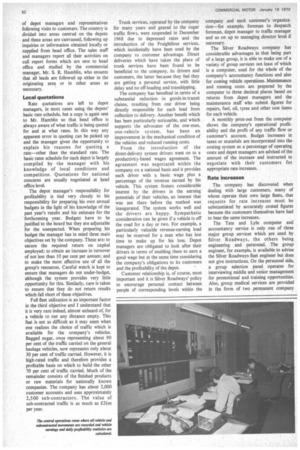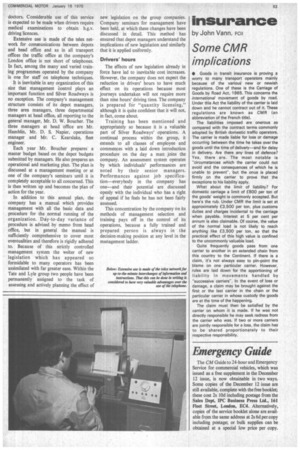controlling transport operation
Page 53

Page 54

Page 55

If you've noticed an error in this article please click here to report it so we can fix it.
First in a new series by David Lowe, MInstTA
Silver Roadways Ltd
BUSINESS efficiency and management techniques are well-worn examples of modern business phraseology. Both can be interpreted to give different meanings, particularly depending on the size of the organization to which they are applied. In this new series I shall be taking a look at a number of haulage and own-account operators with varying sizes and types of vehicle fleets to see how they are facing up to the advances made in these fields. Although hauliers are notably conservative in their outlook many have realized the need to reappraise their planning methods and operational systems in the light of legal and technological changes. These are the points I shall be looking for.
Silver Roadways Ltd., the subject of the first article in this series, was recently described to me by a director of another very large transport organization as the most professional of all haulage companies. It is difficult to assess precisely what professionalism means in road transport. However, if a definition appfoximates to taking special care in staff selection, education and training, and ensuring that those who are planning and controlling operations, selling the service and carrying out all the other necessary functions of a transport operation approach their jobs with a degree of professionalism—then Silver Roadways can certainly be said to qualify!
The company is a member of the Tate and Lyle group of companies and as such is the commercial outlet for the group in terms of road haulage. Some 122 vehicles are operated by the company on A and Contract A licences, the fleet being roughly divided between general haulage operations and tankers for bulk sugar carrying. Majority of the tankers are on Contract A licences to, surprisingly, the British Sugar Corporation, a competitor of Tate and Lyle.
The general haulage fleet is mainly operated on A licences but four vehicles are on contract and five on B licences. The fleet is fully articulated and vehicle makes are divided evenly between Foden and Mercedes, and most are plated for operation at 30/32 tons gross weight. The decision to stick to these two makes is based on the company's experience of what constitutes the most reliable vehicle for its operations.
A network of 11 depots, spread throughout England, Scotland and Wales, is operated with a manager at each, fully responsible for the profitability of his own depot. Each manager is also responsible for selling the company's services in his area and they are aided by three sales representatives based on London, Liverpool and Swansea.
Marketing
Marketing plays a big part in the activities of Silver Roadways and considerable attention is paid to the reports of depot managers and representatives following visits to customers. The country is divided into areas centred on the depots and these areas are canvassed, following up inquiries or information obtained locally or supplied from head office. The sales staff and managers report all their activities on call report forms which are sent to head office and studied by the commercial manager, Mr. S. R. Hamblin, who ensures that all leads are followed up either in the originating area or in other areas as necessary.
Local quotations Rate quotations are left to depot managers, in most cases using the depots' basic rate schedule, but a copy is again sent to Mr. Hamblin .so that head office is always aware of what traffic is being quoted for and at what rates. In this way any apparent error in quoting can be picked up and the manager given the opportunity to explain his reasons for quoting a rate—other than the standard rate. The basic rates schedule for each depot is largely compiled by the manager with his knowledge of local conditions and competition. Quotations for national concerns are usually negotiated at head office level.
The depot manager's responsibility for profitability is tied very closely to his responsibility for preparing his own annual budgets in the light of his knowledge of the past year's results and his estimate for the forthcoming year. Budgets have to be justified to the board but they are adjustable for the unexpected. When preparing his budget the manager has in mind three main objectives set by the company. These are: to secure the required return on capital employed; to obtain an increase in turnover of not less than 10 per cent per annum; and to make the most effective use of all the group's resources. Careful watch is kept to ensure that managers do not under-budget, although the system provides very little opportunity for this. Similarly, care is taken to ensure that they do not return results which fall short of these objectives.
Full fleet utilization is an important factor in the third objective and I understand that it is very rare indeed, almost unheard of, for a vehicle to run any distance empty. This feat is not as difficult as it may seem when one realizes the choice of traffic which is available for the company's vehicles. Bagged sugar, once representing about 90 per cent of the traffic carried on the general haulage vehicles, now represents only about 30 per cent of traffic carried. However, it is high-rated traffic and therefore provides a profitable basis on which to build the other 70 per cent of traffic carried. Much of the remainder consists of the finished products or raw materials for nationally known companies. The company has about 2,000 customer accounts and uses approximately 2,500 sub-contractors. The value of sub-contracted traffic is as much as per year. Trunk services, operated by the company for many years and geared to the sugar traffic flows, were suspended in December 1968 due to depressed rates and the introduction of the Freightliner services, which incidentally have been used by the company to customer advantage. Direct deliveries which have taken the place of trunk services have been found to be beneficial to the company, its drivers and customers, the latter because they feel they are getting a personal service, with little delay and no off-loading and transhipping.
The company has benefited in terms of a substantial reduction in goods-in-transit claims, resulting from one driver being directly responsible for each load from collection to delivery. Another benefit which has been particularly noticeable, and which supports the advocates of the one-man, one-vehicle system, has been an improvement in the mechanical condition of the vehicles and reduced running costs.
From the introduction of the direct-delivery system drivers went on to a productivity-based wages agreement. The agreement was negotiated within the company on a national basis and it provides each driver with a basic wage plus a percentage of the revenue earned by his vehicle. This system fosters considerable interest by the drivers in the earning potentials of their vehicles, an interest that was not there before the method was inaugurated. The system works well and the drivers are happy. Sympathetic consideration can be given if a vehicle is off the road for a day or two. For example, a particularly valuable revenue-earning load may be reserved for a man who has lost time to make up for his loss. Depot managers are obligated to look after their drivers in terms of enabling them to earn a good wage but at the same time considering the company's obligations to its customers and the profitability of the depot.
Customer relationship is, of course, most important and it is Silver Roadways' policy to encourage personal contact between people of corresponding levels within the company and each customer's organization—for example, foreman to despatch foreman, depot manager to traffic manager and so on up to managing director level if necessary.
The Silver Roadways company has considerable advantages in that being part of a large group, it is able to make use of a variety of group services not least of which is a computer, used for the whole of the company's accountancy functions and also for costing vehicle operations. Maintenance and running costs are prepared by the computer to three decimal places based on returns from depot managers and the maintenance staff who submit figures for repairs, fuel, oil, tyres and other cost items for each vehicle.
A monthly print-out from the computer shows the company's operational profitability and the profit of any traffic flow or customer's account. Budget increases in taxes or materials are incorporated into the costing system as a percentage of operating costs and depot managers are advised of the amount of the increase and instructed to negotiate with their customers for appropriate rate increases.
Rate increases The company has discovered when dealing with large customers, many of whom operate their own large fleets, that requests for rate increases must be substantiated by accurately costed figures because the customers themselves have had to bear the same increases.
The Tate and Lyle computer and accountancy service is only one of three major group services which are used by Silver Roadways, the others being engineering and personnel The group engineer, for example, is available to advise the Silver Roadways fleet engineer but does not give instructions'. On the personnel side, a group selection panel operates for interviewing middle and senior management for promotional and training opportunities. Also, group medical services are provided in the form of two permanent company doctors. Considerable use of this service is expected to be made when drivers require medical examinations to obtain h.g.v. driving licences.
Extensive use is made of the telex network for communications between depots and head office and as in all transport offices the traffic office at the company's London office is not short of telephones. In fact, among the many and varied training programmes operated by the company is one for staff on telephone techniques.
It is inevitable in any organization of this size that management Control plays an important function and Silver Roadways is no exception. The company's management structure consists of its depot managers, three area managers, three departmental managers at head office, all reporting to the general manager, Mr. D. W. Boucher. The three managers at head office are Mr. Hamblin, Mr. D. S. Napier, operations manager and Mr. C. Kearslake, fleet engineer.
Each year Mr. Boucher prepares a master budget based on the depot budgets submitted by managers. He also prepares an operational and marketing plan. The plan is discussed at a management meeting or at one of the company's seminars until it is completely acceptable to all concerned. This is then written up and becomes the plan of action for the year.
In addition to this annual plan, the company has a manual which provides management with all the basic data and procedure for the normal running of the organization. Day-to-day variance of procedure is advised by memo from head office, but in general the manual is sufficiently comprehensive to cover most eventualities and therefore is rigidly adhered to. Because of this strictly controlled management system the welter of new legislation which has appeared so formidable to many operators has been assimilated with far greater ease. Within the Tate and Lyle group two people have been permanently assigned to the task of assessing and actively planning the effect of new legislation on the group companies. Company seminars for management have been held, at which these changes have been discussed in detail. This method has ensured that depot managers understand the implications of new legislation and similarly that it is applied uniformly.
Drivers' hours
The effects of new legislation already in force have led to inevitable cost increases. However, the company does not expect the reduction in drivers' hours to have much effect on its operations because most journeys undertaken will not require more than nine hours' driving time. The company is prepared for "quantity licensing," although it is quite confident that it will not, in fact, come about.
Training has been mentioned and appropriately so because it is a valuable part of Silver Roadways' operations. A continual process within the group, it extends to all classes of employee and commences with a laid down introduction procedure on the day a man joins the company. An assessment system operates by which individuals' performances are noted by their senior managers. Performances against job specification—everybody in the company has one—and their potential are discussed openly with the individual who has a right of appeal if he feels he has not been fairly assessed.
This concentration by the company on its methods of management selection and training pays off in the control of its operations, because a fully trained and prepared person is always in the decision-making position at any level in the management ladder.
































































































